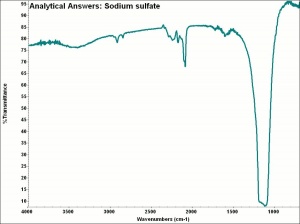Difference between revisions of "Sodium sulfate, decahydrate"
(username removed) |
(username removed) |
||
| Line 1: | Line 1: | ||
== Description == | == Description == | ||
| − | Colorless, crystalline solid. Hydrated sodium sulfate occurs in nature as the mineral mirabilite. In the 17th century it was called Glauber's salt after a German chemist, Johann Glauber who extracted it from Hungarian spring water. Sodium sulfate is used in the manufacture of [http://cameo.mfa.org/materials/fullrecord.asp?name=kraft | + | Colorless, crystalline solid. Hydrated sodium sulfate occurs in nature as the mineral mirabilite. In the 17th century it was called Glauber's salt after a German chemist, Johann Glauber who extracted it from Hungarian spring water. Sodium sulfate is used in the manufacture of [http://cameo.mfa.org/materials/fullrecord.asp?name=kraft%20paper kraft paper], [http://cameo.mfa.org/materials/fullrecord.asp?name=paperboard paperboard], [http://cameo.mfa.org/materials/fullrecord.asp?name=glass glass], [http://cameo.mfa.org/materials/fullrecord.asp?name=ultramarine%20blue%2C%20synthetic synthetic ultramarine blue], and ceramic [http://cameo.mfa.org/materials/fullrecord.asp?name=glaze glaze]. It is also used as a leveling agent in dyeing textiles to ensure even color acceptance. |
== Synonyms and Related Terms == | == Synonyms and Related Terms == | ||
| Line 43: | Line 43: | ||
== Authority == | == Authority == | ||
| − | * | + | * G.S.Brady, ''Materials Handbook'', McGraw-Hill Book Co., New York, 1971 Comment: p. 785 |
| − | * | + | * Richard S. Lewis, ''Hawley's Condensed Chemical Dictionary'', Van Nostrand Reinhold, New York, 10th ed., 1993 |
* ''The Dictionary of Paper'', American Paper Institute, New York, Fourth Edition, 1980 | * ''The Dictionary of Paper'', American Paper Institute, New York, Fourth Edition, 1980 | ||
| Line 51: | Line 51: | ||
* ''Van Nostrand's Scientific Encyclopedia'', Douglas M. Considine (ed.), Van Nostrand Reinhold, New York, 1976 | * ''Van Nostrand's Scientific Encyclopedia'', Douglas M. Considine (ed.), Van Nostrand Reinhold, New York, 1976 | ||
| − | * | + | * Random House, ''Webster's Encyclopedic Unabridged Dictionary of the English Language'', Grammercy Book, New York, 1997 |
* ''The Merck Index'', Martha Windholz (ed.), Merck Research Labs, Rahway NJ, 10th edition, 1983 Comment: entry 8829 | * ''The Merck Index'', Martha Windholz (ed.), Merck Research Labs, Rahway NJ, 10th edition, 1983 Comment: entry 8829 | ||
| Line 57: | Line 57: | ||
* ''The American Heritage Dictionary'' or ''Encarta'', via Microsoft Bookshelf 98, Microsoft Corp., 1998 | * ''The American Heritage Dictionary'' or ''Encarta'', via Microsoft Bookshelf 98, Microsoft Corp., 1998 | ||
| − | * | + | * John and Margaret Cannon, ''Dye Plants and Dyeing'', Herbert Press, London, 1994 |
| − | * | + | * Susan E. Schur, Conservation Terminology: A review of Past & Current Nomenclature of Materials, ''Technology and Conservation'', Spring (p.34-39); Summer (p.35-38); Fall (p.25-36), 1985 |
[[Category:Materials database]] | [[Category:Materials database]] | ||
Revision as of 06:23, 24 July 2013
Description
Colorless, crystalline solid. Hydrated sodium sulfate occurs in nature as the mineral mirabilite. In the 17th century it was called Glauber's salt after a German chemist, Johann Glauber who extracted it from Hungarian spring water. Sodium sulfate is used in the manufacture of kraft paper, paperboard, glass, synthetic ultramarine blue, and ceramic glaze. It is also used as a leveling agent in dyeing textiles to ensure even color acceptance.
Synonyms and Related Terms
sodium sulfate, hydrated; sodium sulfate crystals; mirabilite; Glauber's salt; sal mirabile; crazy water crystals
Other Properties
Soluble in water, glycerol. Insoluble in ethanol.
| Composition | Na2SO4 - 10H2O |
|---|---|
| CAS | 7727-73-3 |
| Melting Point | 33 |
| Density | 1.464 |
| Molecular Weight | mol. wt. = 322.17 |
Hazards and Safety
Nonflammable.
Fisher Scientific: MSDS
Additional Information
Grossi, "Acoustic emission monitoring to study sodium sulfate crystallization in monumental porous carbonate stone" Studies in Conservation 42 (1997), p. 115-125.
Authority
- G.S.Brady, Materials Handbook, McGraw-Hill Book Co., New York, 1971 Comment: p. 785
- Richard S. Lewis, Hawley's Condensed Chemical Dictionary, Van Nostrand Reinhold, New York, 10th ed., 1993
- The Dictionary of Paper, American Paper Institute, New York, Fourth Edition, 1980
- Van Nostrand's Scientific Encyclopedia, Douglas M. Considine (ed.), Van Nostrand Reinhold, New York, 1976
- Random House, Webster's Encyclopedic Unabridged Dictionary of the English Language, Grammercy Book, New York, 1997
- The Merck Index, Martha Windholz (ed.), Merck Research Labs, Rahway NJ, 10th edition, 1983 Comment: entry 8829
- The American Heritage Dictionary or Encarta, via Microsoft Bookshelf 98, Microsoft Corp., 1998
- John and Margaret Cannon, Dye Plants and Dyeing, Herbert Press, London, 1994
- Susan E. Schur, Conservation Terminology: A review of Past & Current Nomenclature of Materials, Technology and Conservation, Spring (p.34-39); Summer (p.35-38); Fall (p.25-36), 1985
